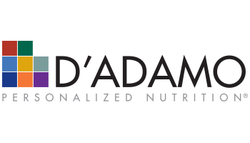Designed by Dr. Peter D’Adamo, our calcium products feature a unique natural source of mineral: The small red seaweed called "Maerl" found only in the isolated areas off the pristine coast of Northwest Ireland. Of all sources of calcium, Maerl has one of the lowest levels of undesirable contaminants. Using Maerl calcium as a base, Dr. D’Adamo has crafted four different mineral formulas using unique cofactors and micromineral ratios specific for each blood type (Phytocal A, B , O and AB) and one general formula (ClearCal) Maerl calcium has one of the lowest levels of lead found in any natural calcium source.
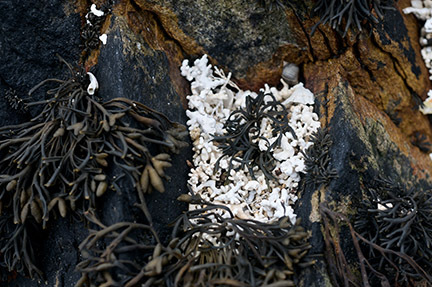
A sample of maerl nestled amidst bladderwrack (Fucus vesiculosus)
All Phytocal® mineral formulas feature Maerl-based sea calcium, the only natural source of calcium with a broad enough buffering range to work effectively amid the differing digestive capabilities of each blood type. Maerl is composed of a wide variety of essential nutrients including calcium, magnesium, boron and zinc. Maerl’s unique structure gives it great versatility, and when woven into formulas tailored to the genetics of ABO blood type, insures a phenomenal rate of bioavailability and utilization. Its superior buffering capacity allows Phytocal Maerl-based calcium to maintain very high rates of absorption despite the variable acid and alkaline levels found in the digestive tracts of the four ABO groups. Phytocal calcium is of highly consistent particle size with excellent dispersion qualities. The solubility of Phytocal calcium can be appreciated visually: There is virtually no sedimentation after dispersion.
Dr. Peter D'Adamo:
"Every testing lab that we've sent our Maerl calcium to for analysis always came back with the same response: 'Where did you find this stuff? It's incredible.' I'd just snicker under my breath, 'Now wouldn't you like to know! "
Why Blood Type Matters
Research as far back as the early 1960s clearly demonstrated that mineral absorption varies between the different blood types. In large part, this is due to major differences between the blood types with regard to an intestinal enzyme known as 'intestinal alkaline phosphatase' (IAP). This enzyme plays an important role in early life, helping to condition the digestive tract of the developing fetus. In later life, IAP plays a crucial role in the absorption of calcium from the diet. Studies have shown that IAP varies by as much as 2.5 fold (250%) between the blood types, from a high level in type O secretors, to a low level in type A non-secretors. Consequently, adjusting a mineral formula to take the blood type differences into account has been a priority for Dr. Peter D'Adamo.
Dr. Peter D'Adamo:
"If more clinicians knew about the link between the blood types and the variations in our intestinal enzymes that control mineral absorption, patients could expect a more precise, above-average response to calcium supplementation. "
Because each blood type possesses variable assimilation capabilities and requires differing cofactor and trace mineral requirements, Dr. D'Adamo designed four different formulas:
- Phytocal A: features higher levels of the important antioxidant selenium; the gastric activating cofactors betaine hydrochloride, rennet and gentian root (Gentiana lutea) plus the mineral-rich herb horsetail (Equisetum arvense). Phytocal A also features significant levels of the important calcium absorption enhancer, ipriflavone, and a small dose of vitamin A to enhance the activity of the calcium absorbing enzyme intestinal alkaline phosphatase.
- Phytocal AB: features higher levels of the important co-minerals magnesium, manganese and molybdenum; the stomach-acidifying cofactors betaine hydrochloride and rennet. Phytocal AB also features yellow dock (Rumex crispus) as a gentle source of iron.
- Phytocal B: features the highest levels of magnesium -an important nutrient for nerve and muscle function; chromium to help balance carbohydrate function and proper doses of iron and copper -two important blood-building nutrients. Phytocal B also features higher levels of vitamin D and vitamin K -important calcium absorption cofactors.
- Phytocal O: features balanced levels of the micro and macro-minerals magnesium, iron, copper and zinc; manganese to help ensure proper joint and ligament function and micro-trace amounts of iodine to enhance thyroid function. Phytocal O also features nettle leaf (Urtica dioica) an important aid to proper intestinal assimilation.
When considering whether to supplement with a multimineral, remember: There are significant differences in calcium absorption and availability. A clean, natural, calcium source with the best bioavailability, designed for your unique absorption capabilities. We think you'll choose Phytocal.
| Common Questions About Calcium Supplementation |
|
Why is calcium important for women? Women generally have thinner bones than men, making them more prone to osteoporosis, a condition in which new bone tissue isn’t regenerated well enough to keep up with the loss. Osteoporosis leaves bones weak, brittle and susceptible to stress fractures or breaks. In addition, as women age, they experience a drop in estrogen—a hormone that helps to maintain bone strength. Does my blood type affect my chances of developing osteoporosis?
How much calcium do I need? The recommended level of calcium for adults age 19 through 50 years is 1000 milligrams per day. An intake of 1200 milligrams of calcium per day is recommended for those age 51 years and older. I don't yet know my blood type, what product should I use? We developed the ClearCal Product for those who do not know their blood type or may have a problem with the blood type synergistic agents used in the Phytocal formulas. Should I take calcium supplements with food? Yes, Dr. D’Adamo suggests taking calcium with meals, as there is evidence that taking calcium supplements on an empty stomach may increase the risk of kidney stones. Should I take my calcium all at once, or in doses throughout the day? Dr. D’Adamo recommends taking no more than 500 milligrams of calcium at once because your body is only able to absorb so much calcium at one time. So, for instance, if you need 1,000 milligrams, split your dose into 500 milligrams twice a day. |
To learn more about our Phytocal and ClearCal formulas click on links below:
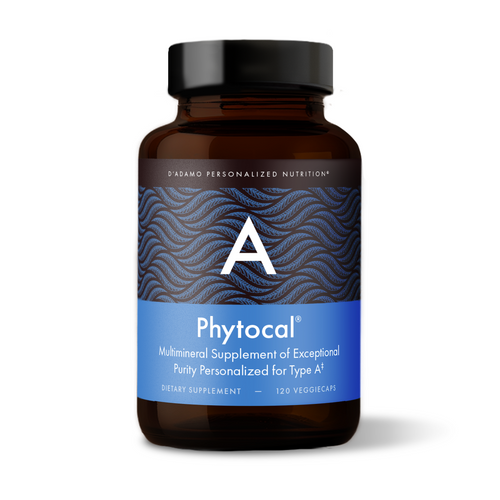 Phytocal A |
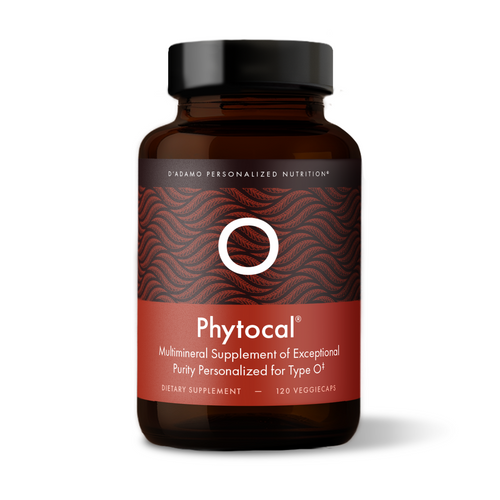 Phytocal O |
 Phytocal B |
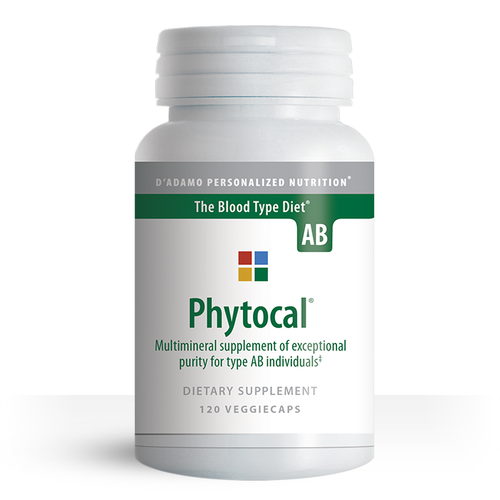 Phytocal AB |
 ClearCal |
- Nakano T1, Shimanuki T, Matsushita M, Koyama I, Inoue I, Katayama S, Alpers DH, Komoda T. Involvement of intestinal alkaline phosphatase in serum apolipoprotein B-48 level and its association with ABO and secretor blood group types. Biochem Biophys Res Commun. 2006 Mar 3;341(1):33-8. Epub 2006 Jan 5.
- Matsushita M, Komoda T.Relationship between the effects of a high-fat meal and blood group in determination of alkaline phosphatase activity.Rinsho Byori. 2011 Oct;59(10):923-9.
- Langman MJ, Constantinopoulos A, Bouchier IA. ABO blood groups, secretor status, and intestinal mucosal concentrations of alkaline phosphatase. Nature. 1968 Mar 2;217(5131):863-5
- Matsushita M, Harajiri S, Tabata S, Yukimasa N, Muramoto Y, Komoda T. Alkaline phosphatase activity in blood group B or O secretors is fluctuated by the dinner intake of previous night. Rinsho Byori. 2013 Apr;61(4):307-12. Japanese.
